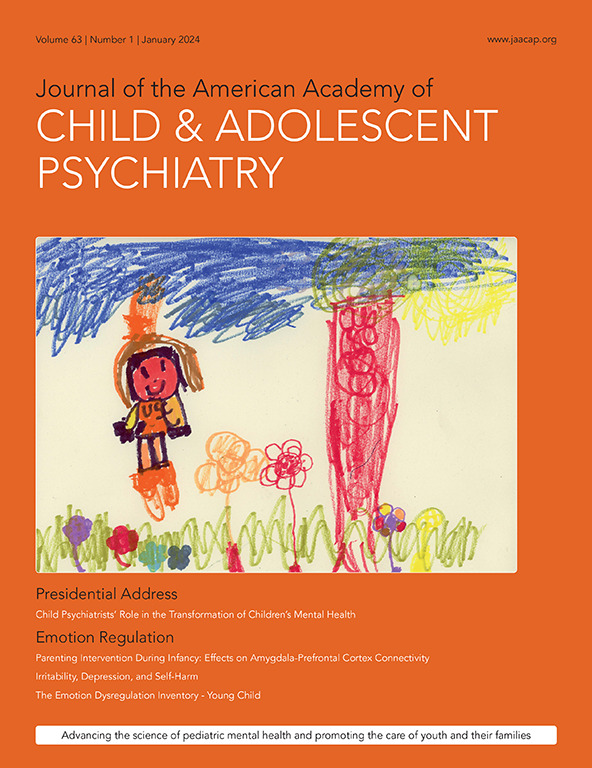Systematic Review: Antipsychotic Medication in Pregnancy and Neurodevelopmental Outcomes in Children.
IF 9.5
1区 医学
Q1 PEDIATRICS
Journal of the American Academy of Child and Adolescent Psychiatry
Pub Date : 2025-04-22
DOI:10.1016/j.jaac.2025.04.008
引用次数: 0
Abstract
OBJECTIVE Antipsychotic medications are widely prescribed, including during pregnancy, and pregnant individuals worry about the potential sequelae for the child. While antipsychotics do not seem to be teratogenic, the long-term neurodevelopmental impact of prenatal exposure remains unclear. A systematic review was conducted to determine if intrauterine antipsychotic exposure increases the risk of adverse neurodevelopmental outcomes. METHOD A systematic search was performed in MEDLINE, Cochrane, Embase, and PsycINFO for studies published before September 7th, 2024. We included original studies assessing cognitive, motor, behavioral, social, and psychiatric outcomes in children prenatally exposed to antipsychotics, excluding case reports, reviews, pre-clinical studies, and studies without a control group. Quality and risk of bias were assessed using the Newcastle-Ottawa Scale (NOS). RESULTS Of 1349 studies identified, 56 underwent full-text screening, and 16 were included in the review. The number of exposed participants ranged from 11 to >15,000. In the eight studies assessing motor development, early motor delays were observed but did not persist into later childhood. Neurodevelopmental disorders were assessed in seven studies. Crude estimates showed greater risk in exposed children, but after adjusting for confounders, most studies found no significant risk. The mean NOS score was 7.1. CONCLUSION Transient motor delays may be associated with antipsychotic use during pregnancy, although future studies adjusting for confounding factors should clarify this risk. After adjustment for confounders, the risk of neurodevelopmental disorders in school-age children does not seem to be increased. Studies with longer follow-up time are required to further investigate the risk of neurodevelopmental disorders. STUDY REGISTRATION INFORMATION Neurodevelopmental Consequences of Antenatal Exposure to Antipsychotic Medication: A Systematic Review and Meta-Analysis; https://www.crd.york.ac.uk/PROSPERO/view/CRD42024499352.系统评价:妊娠期抗精神病药物治疗与儿童神经发育结局。
目的抗精神病药物被广泛使用,包括在怀孕期间,孕妇担心给孩子带来潜在的后遗症。虽然抗精神病药物似乎没有致畸性,但产前暴露对神经发育的长期影响仍不清楚。进行了一项系统评价,以确定宫内抗精神病药物暴露是否会增加不良神经发育结果的风险。方法系统检索MEDLINE、Cochrane、Embase和PsycINFO数据库中2024年9月7日前发表的研究。我们纳入了评估产前暴露于抗精神病药物的儿童的认知、运动、行为、社会和精神结局的原始研究,排除了病例报告、综述、临床前研究和没有对照组的研究。使用纽卡斯尔-渥太华量表(NOS)评估偏倚的质量和风险。结果在1349项研究中,56项进行了全文筛选,16项纳入了本综述。受影响的参与者人数从11人到1.5万人不等。在八项评估运动发育的研究中,观察到早期运动迟缓,但没有持续到儿童后期。在7项研究中评估了神经发育障碍。粗略的估计显示,暴露在环境中的儿童的风险更大,但在调整了混杂因素后,大多数研究发现没有显著的风险。NOS平均评分为7.1分。结论:短暂性运动迟缓可能与妊娠期间使用抗精神病药物有关,尽管未来的研究调整了混杂因素,应阐明这一风险。在对混杂因素进行调整后,学龄儿童神经发育障碍的风险似乎并没有增加。需要更长的随访时间来进一步调查神经发育障碍的风险。研究资料:产前抗精神病药物暴露对神经发育的影响:系统回顾和荟萃分析https://www.crd.york.ac.uk/PROSPERO/view/CRD42024499352。
本文章由计算机程序翻译,如有差异,请以英文原文为准。
求助全文
约1分钟内获得全文
求助全文
来源期刊
CiteScore
21.00
自引率
1.50%
发文量
1383
审稿时长
53 days
期刊介绍:
The Journal of the American Academy of Child & Adolescent Psychiatry (JAACAP) is dedicated to advancing the field of child and adolescent psychiatry through the publication of original research and papers of theoretical, scientific, and clinical significance. Our primary focus is on the mental health of children, adolescents, and families.
We welcome unpublished manuscripts that explore various perspectives, ranging from genetic, epidemiological, neurobiological, and psychopathological research, to cognitive, behavioral, psychodynamic, and other psychotherapeutic investigations. We also encourage submissions that delve into parent-child, interpersonal, and family research, as well as clinical and empirical studies conducted in inpatient, outpatient, consultation-liaison, and school-based settings.
In addition to publishing research, we aim to promote the well-being of children and families by featuring scholarly papers on topics such as health policy, legislation, advocacy, culture, society, and service provision in relation to mental health.
At JAACAP, we strive to foster collaboration and dialogue among researchers, clinicians, and policy-makers in order to enhance our understanding and approach to child and adolescent mental health.

 求助内容:
求助内容: 应助结果提醒方式:
应助结果提醒方式:


